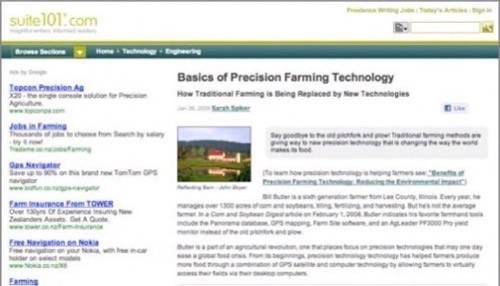When it comes to content farms, companies that churn out hundreds or thousands of new pieces of content every day, Demand Media has harvested most of the headlines over the past year. But it’s not the only company out there betting on quantity of content – others include Associated Content (acquired by Yahoo! in May), About.com (owned by the New York Times), Mahalo (founded by Jason Calacanis, who sold his previous business Weblogs, Inc. to AOL in 2005) and Answers.com.

Suite101 is a relatively low profile site compared to the others mentioned above. Yet it produces 500 new pieces of content per day. I spoke to Suite101 CEO Peter Berger to discuss why it produces so much content, how it compares to Demand Media, and what Google is doing about content farms.
24 Million Uniques
Suite101 is a publishing platform that hosts articles about niche topics. As its name implies, Suite101 focuses on ‘101’ style writing – beginners articles on thousands of topics. Berger described Suite101 as “a service to help writers be successful online.” It currently has 5,000 active writers and four different language sites. The biggest of these is the english language .com site, which he said currently has 24 million unique visitors a month.

In a search on Google, Suite101 came up with 6.5 million pages on the Web. That isn’t far behind About.com, with 8.29 million. It isn’t on the same level though (in terms of quantity) as Demand Media – which at last estimate pumps out 7,000 new articles every day (it was 4,000 back in November). At that rate, Demand Media is probably producing upwards of 2.5 million new pieces of content per year.
Eating The Lunch of Traditional Publishers
Berger said that the name of the game in this space is SEO: writing content “that search engines want to present their users.”
Like the Demand Media CEO when I questioned him about their business model, Berger claimed that his company’s model is not competing with traditional journalism. Rather, Berger said that Suite101 and others compete with “non-fiction publishing.”

For example, he said, in the past if you were re-modeling your house you’d go buy a book on that subject. But now, people just Google it. He claimed that traditional publishers
have “not woken up [to this] at all.”
I asked what traditional publishers could do to ‘wake up’? Berger replied that there has been “no response from publishing houses” to topic-based sites like Suite101. The best that traditional publishers have come up with, said Berger, is ebooks. However “the questions of the users are so much more specific” than what ebooks can address, he continued. “What rules in this space is topic expertise” – which he noted is what Suite101 is a platform for.
Demand Media vs. Google
So is Suite101 worried about the sheer scale that Demand Media is working at and that they may dominate this space? Berger thinks that Demand Media is only interested in the “commercially lucrative space” and not the “more niche subjects” that Suite101 covers.

What’s more, Berger believes that Google is a threat to Demand Media’s business model: “Google is best at solving problems algorithmically.”
“Finding niche requirements is becoming a commodity,” he continued, “and Google – not Demand Media – is best placed to master that space.”
What he means by that is that Demand Media has sophisticated software for identifying what content is ‘in demand’ on the Web (hence its name). But Google owns the dominant search engine, where millions of people go to search for content. So Google is in a position of power over Demand Media – its options include open sourcing the mechanism for identifying what content is needed on the Web (thus denying Demand Media its main competitive advantage), or it could change its PageRank algorithm to better account for quality over quantity (which based on what I’ve heard, is already happening).
The New New Agriculture
Suite101 doesn’t seem concerned with Demand Media vs Google. Berger says that Suite101 is focused instead on writers. He sees his company eventually moving beyond “professionalised niche writing” and becoming a “personal brand builder for qualified individuals.” In other words, a place where subject matter experts can come to share their expertise.
Multiply this over hundreds of thousands of niche topics, and it’s a potentially valuable business. But highly competitive – because others like Mahalo, About.com and Associated Content are also farming the Web for the big bucks.










